Ha ha ha, Ho ho ho!
Ahoy to the World!
‘Twas the night before Christmas and in the Faubourg
At the edge of the crescent, no creature stirred.
Under the shroud-like blue plastic from FEMA
That flapped in the wind in the wake of Katrina,
Nothing was hung by the chimneys with care
Since chimneys and roofs were no longer there.
The houses, abandoned for trailers or Texas,
Were circled with watermarks, branded with Xs,
And in them no sugarplums danced in kids’ heads,
For no little children slept snug in their beds
On this night before Christmas in Faubourg-St John
Where time had stopped dead, while the world carried on.
Then, lo, from the depths of what once was my garden
(Now a wild cesspool of strange hydrocarbons)
Up drift some voices from out of the dark
To compete with the flapping of my FEMA tarp:
“They all axed for you, dawlin’. How did you do?”
“—Nine feet of water, and how about you?”
“Do ya know what it means to miss New Orleans?”
“—Not enough ersters—or rice and red beans!”
I‘m certain of whom this can’t possibly be:
It’s not the adjuster; it’s not Entergy;
With looters gone elsewhere, this can’t be a stick-up;
And who can remember the last garbage pick-up?
It’s surely not someone from Capitol Hill
To tell me, at last, whether I can rebuild.
I lift back what’s left of my old cypress shutters
And peek past the tangle of phone lines and gutters,
And what to my wondering eyes should appear?
Not Santa Claus and his team of reindeer
But, costumed in rubber attire and gas masks,
A long second-line waving hankies and flasks.
Rather than coconuts, beads and doubloons,
This krewe carries gear (and, just barely, a tune).
With wet vacs and power tools, sheetrock and nails,
Brawny and Brillo piled high in their pails,
They’re Superdome faithful, survivors of attics,
Mardi Gras maniacs, Jazz Fest fanatics,
Carnival trackers (from Allah to Zeus),
Believers in Saints (whether St. Jude or Deuce),
Joined by a couple of Dutch engineers,
Some out-of-town builders and church volunteers.
They pause at the dead Live Oak next to my door
In T-shirts declaring Make Levees Not War.
Since ditching my mold-ridden fridge at the curb,
MREs have become the hors d’oeuvres that I serve
So I pass them around with Abita’s new ale
When a wrench taps, “Clink! Clink!” on the side of a pail:
“To Blanco,” they cry, “She got contra-flow down!
To Nagin—he sure told those Feds and Mike Brown!
To NOLA dot com, CNN, and the Times
Who cut to the quick of the Superdome crime!
To all those who took in our downtrodden folks,
Or ferried them out in their flat-bottom boats!
To Tennessee… Texas… Jackson… Atlanta…
Our Baton Rouge brothers … and Lou-i-si-ana!”
I notice no Rudy steps up as their leader,
Yet something unseen guides this flock of believers,
A force that transcends rich or poor, black or white,
A light that can steer this brigade through the night.
In a twinkle they’ve finished the last of the ale
And they hoist their equipment, their masks and their pails:
“On, Comet! On, Borax! On, on Spic ‘n Span!
“Come (Yule) Tide and Cheer! Come, All, let us plan!
Up, Mildew! Off, Mold! Out, out, Toxic Waste!
Come, Shout! Away, Wisk! Come, let us make haste!
To the top of the water mark! Up, past the stair!
Let the City that Care Forgot know that we care!”
Then to Lakeview, Gentilly, Chalmette and the East,
Away they all marched to a Zydeco beat.
Ere they rose past the tarps, I heard a voice say
“Merry Christmas—and Laissez les bon temps rouler!”
Happy Holidays from Stephany New Orleans, 2005
Tuesday, December 20, 2005
Monday, December 12, 2005
The undertow
This editorial in Sunday’s New York Times gets it right. Even as we celebrated the holidays this weekend in our annual tree-trimming party, there was that same old undercurrent—it forreal floors you, how much it hurts to know that we are being forgotten.
Thursday, December 08, 2005
The drive to work these days.
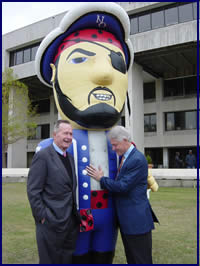
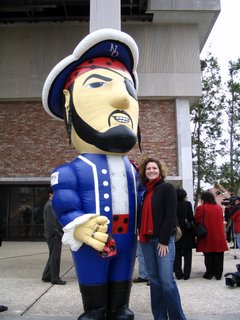
Today I drove to campus for the first time since this summer, when I was teaching one section of freshman composition, when one of my students called me "Miss Chewbacka" because the new Star Wars had just come out, and when Tropical Storm Cindy was the big news, with her 80-mile-per hour winds and 15-hour power outage. (The day after Cindy I drove to get coffee at the only open coffee shop and was charmed by the camaraderie shared in the long line for espresso.) In other words, it was a lifetime ago.
I think I've mentioned before that one of my Uptown friends refers to the dry, and mostly white area of town that hugs the Mississippi River as the "Isle of Denial." One needs only to drive North or East to see what the rest of the city is like. And, in doing so, one realizes why one would rather live one's life solely on The Isle.
I hadn't cried in perhaps a week, maybe longer, but driving my regular commute for the first time since the storm--up Franklin and left at Robert E. Lee to the University--those tears came back, and hard, like I was making up for lost time.
I used to fantasize about buying a house in the neighborhood where Tom and Brandi had just settled in before Katrina. Gentilly was a primarily-black suburb of New Orleans, and its houses were mostly cozy ranches on piers. There was one house I liked, in particular, that was for sale last year. It had a kind of Spanish Bungalow flair to it, with stucco siding and red awnings, but it wasn't in very good shape, and anyway, buying is, for me, a pipe dream with all the debt I've got (I'd better not go there, or I'll start crying anew!)
Now, that house, and most of the houses on my commute, bears the watermark-scar of the flooding that, if one imagines sitting inside (as one would do in a house there--sit inside with family and friends, and eat and share, just as we had sat and eaten and shared in Tom and Brandi's house three weeks before the end of August,) would cover one's head.
I have these images now. It's not "seeing things," exactly; it's something else. It is as if my post-Katrina memories have superimposed themselves on the pre-Katrina ones. Now, when I recall memories of experiences I had in the areas that flooded, it feels like I’m looking at an insect preserved in amber.
I’d been down Franklin before, but now it looks worse. The gutting has begun. The signs have taken over. One that I saw today read, “We Demolish Houses.”
So I cried when I saw the house I once dreamed about owning, and I cried when I passed the intersection of Franklin and Gentilly, where the ridge saved the big houses and patches of green grass appear almost ridiculous, laughable. To have to mow one’s lawn in such a place! I cried when I saw FEMA trailers parked in front yards. I cried when I realized I was on auto-pilot, steering clear of the same potholes, the same sunken slabs of what passes for New Orleans’ streets (oh, to have THAT complaint NOW!) I cried when I saw the Sav-A-Center, where I once made all of my grocieries—how its parking lot has become a staging area for contractors and their equipment. I cried when I saw the once-majestic pecan trees along Robert E. Lee, the ones where I’d often seen old men with brooms banging the branches and collecting nuts in plastic shopping bags—the trees now splintered and nearly-bare (why is it that we always call big Southern trees “majestic”?)
At any rate, it was all one cry, but each of these markers seemed worthy of its own, good mourning.
I shaped up once I saw the signs for “Bush-Clinton Katrina Fund Event Parking.” They seemed so, well, weird, posted there next to signs for home demolition, but there they were.

I parked in the Engineering Building’s parking lot and walked to the quad in front of the library. I’ll admit it: my spirits lifted, pep-rally-style. There was a big, white, event-tent, and the new UNO mascot, “Air Pierre,” was there, bonking around, looking silly.
I approached two English Department colleagues of mine, Gary Richards and Anne Boyd, who both lost their homes. They could see that I’d been crying, and when I explained the “commute,” Gary said, “It doesn’t take much these days, does it. He’d gone to see the movie Rent, which he said, “wasn’t even very good,” and he positively bawled. Anne said she, too, was having crying bouts. What a weepy town we are.
The event was crowded—standing room only, and I stood in the back, next to the ubiquitous UNO-event jazz band and in front of the press. After a 45-minute wait, Presidents Clinton and George H. Bush finally arrived, along with Governor Blanco and the “first ladies” of Mississippi and Alabama. The purpose of the event was to announce the distribution of 90 million of the approximately 100 million the Bush-Clinton Katrina fund has saved. What everyone talked about was how the money came “from all corners of the world,” and they also talked about the importance of education and faith. Not surprisingly, the money was being allotted to higher education and churches. I could do without the faith-based stuff, but whatever.
Afterwards I tried to catch a photo of Clinton, but only got one where he’s a tiny ant. I had to doctor it to even make him visible, but I just wanted to have proof of seeing him. Now sure why, exactly. This is the prick who turned his back on the genocide in Rwanda, after all. But today was about “spirit,” and it was effective, in that sense. I even had my picture taken with “Air Pierre” after hearing from the English chair, Dr. Schock, that my job MIGHT still be mine in the fall.
I feel strange, though, like I don’t have any say in the funds or the future or anything, really. I am still so stressed out that my neck hurts and I clench my jaw. I worry about the future commute, about driving through devastation every day… devastation that is and is not my own. What must that do to a person! What it is doing to me, now!
Tuesday, December 06, 2005
Yet another loss...
My longtime friend, Dave Sobel, who plays drums for the New Orleans Klezmer Allstars, told me last night that he is leaving New Orleans. He and girlfriend Jenny Baggert will move to Brooklyn in six months. There, they will seize the opportunities afforded them—members of the Katrina Diaspora. Dave will be able to play with the dozens of New Orleans musicians who have moved to New York City. He will have gigs and money and the tourists and citizens of New York will revel in his talent, and reward him with cash. Still, I couldn’t congratulate him. Instead, I walked away.
I realize this may not reflect well on my character, but I am angry about the loss of New Orleans musicians to other cities. I mean, I am angry at the musicians, themselves, as well as at the cities now hosting them. Tim Green said that the city of Austin—yes, the city government, itself—has called him repeatedly and offered him more money than he could ever make in New Orleans to move to Austin. Cities like Houston, Portland, New York, Los Angeles, and San Francisco are now benefiting from our loss. The musicians, themselves, are benefiting from our loss. They are finally getting the recognition—and the pay—that they deserve. So why I am so MAD at them?
Last night I went to see the Rob Wagner Trio at d.b.a. Rob is one of my favorite New Orleans musicians—an amazing saxophone player and composer. He moved here from out of town maybe ten years ago and refined his playing and writing skills in New Orleans.
What Rob found here—a community of like-minded musicians, an endless supply of gigs (gigs that unfortunately didn’t pay well enough that he could give up his day job of writing computing software,) a culture that, I like to imagine, fed his music, fed his soul—is what hundreds of musicians like Rob have found, too. They moved here from other cities, contributed to the musical culture through their own music (many of these musicians have pushed the boundaries of jazz in New Orleans,) and now, they’re leaving. Rob Wagner, Nobu, Dave Sobel, Linnzi Zaorski, Devin Philips, Greg Schatz—these are just a few names on a very long list of one-time New Orleans transplants who have taken this post-Katrina opportunity to move up, to move on.
I guess I feel betrayed. How could they come and soak up whatever this city had to offer them only to move away when the city fell down? How will our culture recover without them?
Last night I said to Bru that one thing that struck me was how little the musicians who have left and are leaving seem to care about their audience. It doesn’t matter to them who’s clapping, who’s paying the cover, who’s tipping the band, as long as the money comes in. They simply want to make a living—the best living that they possibly can—as working musicians, whatever the audience.
But how could they prefer to play to New York audience—one filled with tourists and corporate types with fat wallets—an audience comprised of patrons able to pay to $20 covers each week, no problem? How could they prefer them to us? I guess that’s what it feels like to me. It feels like Dave Sobel is saying, “Yeah, I had a great time here. Really learned a lot. But now I’m on to bigger and better things. Peace.” I feel like these musicians who have left and are leaving care more about their own future than they do the future of the city.
And the hardest part is knowing that we, the local music patrons of New Orleans, have evidently not supported our musicians in the manner that counts: in money. We have been spoiled by low-or-no covers, we have tipped in single-dollar bills. Our drunken declarations of appreciation are meaningless when it comes to making the musician’s life tick. We didn’t pay up.
As a one-time manager of the Dragon’s Den, where I booked music for several years, I knew we could charge more at the door, and pay more out of the register. I knew the musicians deserved better, but I didn’t own the place, and frankly, when I allowed the band to charge a higher cover, the patrons opted not to come in. Why would they want to fork over ten bucks when just down the street they can hear another band for free? How could we—the club managers—have made this city work for the musicians? How could we have prevented this mass exodus from occurring?
Perhaps more importantly, what can we do now?
Evidently, Harry Connick, Jr., and Branford Marsalis think this is the answer. They’d like to build a “musicians’ village” in New Orleans. I may be wrong, but I don’t think that housing is the real issue here. I think the real issue is how we have failed our musicians in the past, how other American cities are pouring on the sympathy—and the cash—and how there won’t be a population with fat enough wallets to support those musicians who do return. After all, the artists and educators, the working professionals, who were the ones who supported their careers (in cash), in the first place are losing their jobs, too.
I realize this may not reflect well on my character, but I am angry about the loss of New Orleans musicians to other cities. I mean, I am angry at the musicians, themselves, as well as at the cities now hosting them. Tim Green said that the city of Austin—yes, the city government, itself—has called him repeatedly and offered him more money than he could ever make in New Orleans to move to Austin. Cities like Houston, Portland, New York, Los Angeles, and San Francisco are now benefiting from our loss. The musicians, themselves, are benefiting from our loss. They are finally getting the recognition—and the pay—that they deserve. So why I am so MAD at them?
Last night I went to see the Rob Wagner Trio at d.b.a. Rob is one of my favorite New Orleans musicians—an amazing saxophone player and composer. He moved here from out of town maybe ten years ago and refined his playing and writing skills in New Orleans.
What Rob found here—a community of like-minded musicians, an endless supply of gigs (gigs that unfortunately didn’t pay well enough that he could give up his day job of writing computing software,) a culture that, I like to imagine, fed his music, fed his soul—is what hundreds of musicians like Rob have found, too. They moved here from other cities, contributed to the musical culture through their own music (many of these musicians have pushed the boundaries of jazz in New Orleans,) and now, they’re leaving. Rob Wagner, Nobu, Dave Sobel, Linnzi Zaorski, Devin Philips, Greg Schatz—these are just a few names on a very long list of one-time New Orleans transplants who have taken this post-Katrina opportunity to move up, to move on.
I guess I feel betrayed. How could they come and soak up whatever this city had to offer them only to move away when the city fell down? How will our culture recover without them?
Last night I said to Bru that one thing that struck me was how little the musicians who have left and are leaving seem to care about their audience. It doesn’t matter to them who’s clapping, who’s paying the cover, who’s tipping the band, as long as the money comes in. They simply want to make a living—the best living that they possibly can—as working musicians, whatever the audience.
But how could they prefer to play to New York audience—one filled with tourists and corporate types with fat wallets—an audience comprised of patrons able to pay to $20 covers each week, no problem? How could they prefer them to us? I guess that’s what it feels like to me. It feels like Dave Sobel is saying, “Yeah, I had a great time here. Really learned a lot. But now I’m on to bigger and better things. Peace.” I feel like these musicians who have left and are leaving care more about their own future than they do the future of the city.
And the hardest part is knowing that we, the local music patrons of New Orleans, have evidently not supported our musicians in the manner that counts: in money. We have been spoiled by low-or-no covers, we have tipped in single-dollar bills. Our drunken declarations of appreciation are meaningless when it comes to making the musician’s life tick. We didn’t pay up.
As a one-time manager of the Dragon’s Den, where I booked music for several years, I knew we could charge more at the door, and pay more out of the register. I knew the musicians deserved better, but I didn’t own the place, and frankly, when I allowed the band to charge a higher cover, the patrons opted not to come in. Why would they want to fork over ten bucks when just down the street they can hear another band for free? How could we—the club managers—have made this city work for the musicians? How could we have prevented this mass exodus from occurring?
Perhaps more importantly, what can we do now?
Evidently, Harry Connick, Jr., and Branford Marsalis think this is the answer. They’d like to build a “musicians’ village” in New Orleans. I may be wrong, but I don’t think that housing is the real issue here. I think the real issue is how we have failed our musicians in the past, how other American cities are pouring on the sympathy—and the cash—and how there won’t be a population with fat enough wallets to support those musicians who do return. After all, the artists and educators, the working professionals, who were the ones who supported their careers (in cash), in the first place are losing their jobs, too.
Monday, December 05, 2005
This should be good...
ROB WAGNER/HAMID DRAKE/NOBU OZAKI at D.B.A. (618
Frenchmen Street) 10PM Monday Dec. 5
Rob Wagner, saxophones and compositions
Hamid Drake, drums
Nobu Ozaki, bass
"All events that don't appear in the media are claimed
as a victory by the movement . . ."---The Anti-Media
Movement.
At first I was quite peeved that our local guardians
of the fourth estate could not find the significance
of this event worthy of their precious media space
(and their less than precious efforts,) but than I
realized that if they had, how significant could have
it ever been? The best of New Orleans culture has
always hidden in plain view, shielded by its apparent
extravagant ubiquitousness.
But we know how to see (hear) beyond the mask, and we
will talk to each other face to face, immediate as
wind and water, and spread the word. And this event
will be a great success, appreciated by all who manage
to attend . . .
Benjamin
P.S. I'm told by the Powers That Be that this concert
will start at 10PM N.R.T. (New Realities Time) not
10PM S.N.O.M.T. (Standard New Orleans Musicians' Time)
so plan your arrival accordingly.
VALID RECORDS "Valid Where Prohibited!"
--from an email sent to me by Bywater resident and fellow music lover, Ben Lyons
ROB WAGNER/HAMID DRAKE/NOBU OZAKI at D.B.A. (618
Frenchmen Street) 10PM Monday Dec. 5
Rob Wagner, saxophones and compositions
Hamid Drake, drums
Nobu Ozaki, bass
"All events that don't appear in the media are claimed
as a victory by the movement . . ."---The Anti-Media
Movement.
At first I was quite peeved that our local guardians
of the fourth estate could not find the significance
of this event worthy of their precious media space
(and their less than precious efforts,) but than I
realized that if they had, how significant could have
it ever been? The best of New Orleans culture has
always hidden in plain view, shielded by its apparent
extravagant ubiquitousness.
But we know how to see (hear) beyond the mask, and we
will talk to each other face to face, immediate as
wind and water, and spread the word. And this event
will be a great success, appreciated by all who manage
to attend . . .
Benjamin
P.S. I'm told by the Powers That Be that this concert
will start at 10PM N.R.T. (New Realities Time) not
10PM S.N.O.M.T. (Standard New Orleans Musicians' Time)
so plan your arrival accordingly.
VALID RECORDS "Valid Where Prohibited!"
--from an email sent to me by Bywater resident and fellow music lover, Ben Lyons
We do what we can.
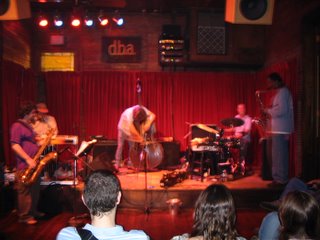
Last night I went to see 3 Now 4 at d.b.a. and saw Tim Green for the first time in a long while. Tim Green is positively the best saxophone player there is. He played sax with the Hi-Life Rescue Dance Band back four years ago, I guess, and I remember how happy I was to sing with someone who was so attentive to the group dynamic. He and I had a call-and-response, uh, "jam," and I was at that moment forever endeared to his playing.
I remember driving back to New Orleans from a gig we had in Lafayette. At the time I was volunteering for WRBH, 88.3 f.m. (Radio for the Blind and Print Handicapped,) and he talked about his tenure there and as station manager for WWOZ. He also talked about leaving his work in radio to work as a full-time musician. I was struggling with my own decisions. I'd just started graduate school and was singing with Hi-Life and bartending at the Dragon's Den and volunteering, and I didn't know what I really wanted to pursue. I can't remember what Tim's advice was, exactly. I don't think it was radical. Something along the lines of following one's heart, I think. At any rate, I just remember thinking that this was one righteous dude, so to speak. He's got the patience and wisdom thing down.
Tim sounded great. He was playing a crazy horn with what looked like the world's smallest diving mask attached to the bottom. At the set break he told me that someone gave it to him while he was in San Francisco after the storm--just walked up to him and said something like, "You should have this." It's appearently called a conosax and is one of only 12 in the world. It's worth $42,000. Anyone else and I would think that San Fran man was crazy, but I can absolutely understand feeling compelled to endow Tim Green with such a gift.
Tim looked great, too. Bru (from Hi-Life) and I agreed--he looks younger and happier than we'd seen him in a long time. Tim attributed it to his being happy to be home. I squeezed him too hard. I got tears in my eyes. After hearing that James Singleton is gone--even if he IS coming back once a month for gigs--after hearing that Rob Wagner and Schatzy and Jeremey Lyons and Devin Phillips and Nobu and so many, many, many musicians are not planning to come back, I was beginning to feel that our musicians would all abandon us.
I told Tim about a quote I read in this week's Gambit. Playwright Richard Read said, "We're all mouthing the same thing: 'Oh, we certainly don't blame anyone who has to leave; people lost jobs and homes.' But the emotional side of it is, 'Why don't you people move back? This is a great time to make things happen in the city.'" We—Tim, Bru, and I—all agreed that it’s hard not to be angry, to feel a little abandoned by folks who’ve decided to leave—especially the musicians, but we really can’t blame them.Tim said there are lots of gigs here, that he’s playing all the time, solid.He said he wants to be here; that in Algiers, where his home it, life is good—so good that it can be hard to stay motivated to work on the recovery, but he sends out emails and he does what he can.Oh, and when he As long as there is music, there will be some semblance of hope.
Tim also told me about 88.7 f.m., which is being run out of Algiers by IndyMedia.org.nbsp; I turned it on this morning, and it was like a fucking revelation. The music is commercial-free, uncensored, and fantastic. I heard old De La Soul and new Kanye West and Lauren Hill and Irish protest songs, and all kinds of music for revolution. Plus, Tim says that the radio staff goes out with microphones and collects people’s stories. They also announce resources. I couldn’t help laughing when I heard this one: “A free clinic is available for treatment at preventative medicine at Mardi Gras World.” A free clinic at Mardi Gras World! Oh, the things we DO when we do what we CAN!
Thursday, December 01, 2005
Why I am a coward.
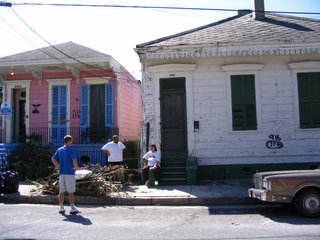
Here Miss Diane sits on Miss Grace's stoop. This was back when we first returned to New Orleans--back before she'd been evicted.
I am grading students essays, trying to find ways of telling my students why an audience might not appreciate a female dog being referred to in an essay as “my bitch” or a car as an “automated vehicular contraption” when I am interrupted by one of the many new noises of the neighborhood. I have become used to the Red Cross mobile’s cop-horn and the once-regular but now sporadic rumbling of Humvees and scraping of Bobcats, but this noise was a banging I’d not heard. I peak out the slats of our shutters and see a big and sparkling Cadillac, and behind it a locksmith’s truck. It is Miss Diane and Miss Grace’s former landlord, and she is having their locks changed. I want to fucking kill her, and I mean it; I have not felt rage like this since I can remember.
Yesterday, Miss Diane and Oscar came by their old house—the house with new locks—to survey the work that had been done. Weeks ago they were evicted. A terse letter informed them that “due to extensive storm damage to the property,” they and Miss Grace next door would have to vacate the home. The landlord said she expected to perform the repairs and would contact them once completed. The extensive damage was, in fact, minor roof damage. The work that has been done: locks have been changed.
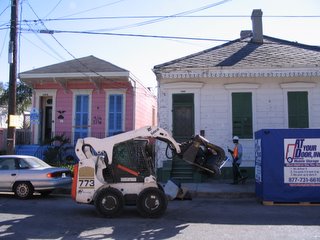 A week ago I saw Miss Diane and Oscar sitting in front of the house. They were both crying. Yesterday, Miss Diane said she was ready to report their landlord to Channel 6’s investigative reporter, Richard Angelico. Miss Diane, Oscar, their 30-year-old son with severe cerebral palsy, and their 15 year-old, Oscar, Jr., have been living with Miss Diane’s daughter. They had to give up their dogs because her daughter wouldn’t allow them. Every day they spend an hour driving into town. Oscar lost his job of 24 years to “some Spanish guy” who doesn’t know printing press work and who Oscar suspects is getting paid pennies on his dollar. Their rent at the house across the street was $390/month. Now, you can’t find a place in this area for less than $1,000. It is gay-town, Cadillac-town, white-town; we don’t have room for the Miss Dianes in the Marigny anymore.
A week ago I saw Miss Diane and Oscar sitting in front of the house. They were both crying. Yesterday, Miss Diane said she was ready to report their landlord to Channel 6’s investigative reporter, Richard Angelico. Miss Diane, Oscar, their 30-year-old son with severe cerebral palsy, and their 15 year-old, Oscar, Jr., have been living with Miss Diane’s daughter. They had to give up their dogs because her daughter wouldn’t allow them. Every day they spend an hour driving into town. Oscar lost his job of 24 years to “some Spanish guy” who doesn’t know printing press work and who Oscar suspects is getting paid pennies on his dollar. Their rent at the house across the street was $390/month. Now, you can’t find a place in this area for less than $1,000. It is gay-town, Cadillac-town, white-town; we don’t have room for the Miss Dianes in the Marigny anymore.I want to scream at the bitch who’s having their locks changed. Miss Diane says she’s a lawyer, and judging from the looks of her, her Cadillac, and her Metairie accent, I suspect she’s the kind of lawyer we could all use less of. A lawyer whose motives are winnings, not winning. I hope she dies. Tomorrow. Today. Now. No—better than that, I hope she loses her job; I hope her kids get debilitating illnesses and have to rely on Medicaid; I hope she loses her home and has to stay with relative and has to give up her pets and has a bitch for a landlord who tells her she will repair the home but does nothing but change the locks.
And I want to say these things to her, but apparently I am a coward. I post pleas on behalf of my neighbors on online forums. I don’t confront bitch landlords who deserve to die. Evidently, it’s just not my style.
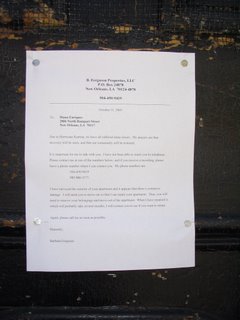 The bitch's words.
The bitch's words.
Subscribe to:
Posts (Atom)
